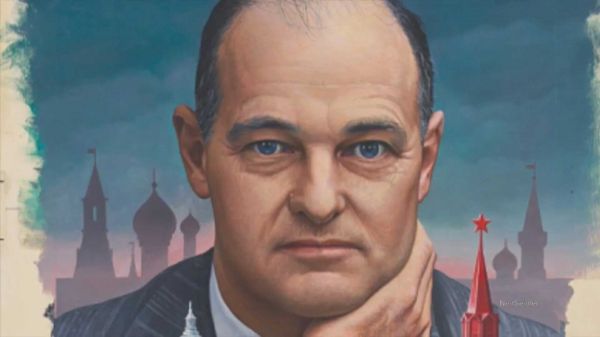Putin and Stalin
Just as Western nations had high hopes for Russia under Vladimir Putin, Post-war Americans had high hopes for the Soviet Union under Joseph Stalin. And just as Putin has done, Stalin betrayed the hopeful Westerners, and made clear that he would rule as dictator, not only of the Soviet Union, but most of Eastern Europe. But Europeans and Americans reacted slowly to Stalin.
American diplomat George Kennan believed that America needed to get on the stick before it was too late to counter the threat. In February, 1946, he sent an 8,000 word cablegram to the U.S. State Department from his post in Moscow that single-handedly defined point-by-point America's Post-war stance toward the Russians.
No one could ever accuse Kennan of mincing words about important issues, and he did nothing out of the ordinary in his 1946 telegram, which historians have termed the "Long Telegram." Knowing what he knew, Kennan did not anticipate "peaceful co-existence" with the Soviets. The wording of his "Long Telegram" is so prescient, I include a defining portion of it for my readers. He described Stalin as:
. . . only the last of a long session of cruel and wasteful Russian rulers who have relentlessly
forced their country on to ever new heights of military power in order to guarantee external
security for their internally weak regimes.
I could hardly believe my eyes—and Putin, the latest in wasteful Russian rulers who use militarism to compensate for his nation's poor internal functionality.
Kennan goes far beyond that, however. He quotes a speech by the Soviet leader Stalin, in which Stalin says:
. . . there will emerge two centers of world significance: a socialist center . . . and a capitalist
center. The battle between these two centers for command of the world economy will decide
the fate of capitalism and of communism in the entire world.
Stalin's use of "capitalist" and "socialist" impressed me. He gives the two terms a kind of generic timelessness—capitalism defining the free society; socialism defining the controlled life. Note also that Stalin does not use the terms "free" and "controlled." He doesn't have to. Karl Marx defined the terms for him. Stalin only explains the terms as Marx taught him. When you think about it, Stalin speaks very freely.
Not for a general audience, of course, only the Soviet elite.
It should give left-wing liberals cause to pause. The free-wheeling capitalist causes inequality in a society, the result of allowing people to grow rich, and others to remain poor. All socialism does is forcably level the playing field, so that everyone has the same—meaning nothing! Under socialism, society has to pay through the economic nose to assuage human envy and resentment.
The socialist-capitalist thing has transitioned into the American-disunity thing. Our society has now internalized the capitalist-socialist poles in one ludicrous nation. The poles empower our wasteful rulers. We have to tolerate both on our turf. We don't need the Putin thing on top of that.

